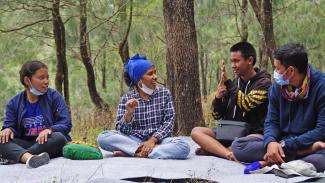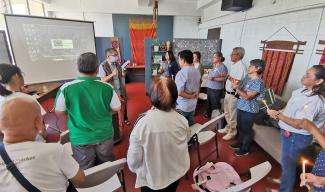As part of its ongoing commitment to foster unity to foster unity in diversity throughout Indonesia the Menoken journey recently travelled to the districts of South-Central Timor, with the aim of strengthening networks, sharing ideas for the protection and preservation of the environment. With theme of Menoken in Tanah Timor, the menoken putting special focus on the younger generation to be the next leader, this initiative was supported by a number of communities from outside East Nusa Tenggara (NTT).
On Tuesday, 24 August 2021, Menoken in Tanah Timor, brought together community members, local officials and representatives, to discuss plans for environmental protection in the two locations. A key theme of the Menoken in Tanah Timor, was how the youth could lead the way in these initiatives, thereby planting the seed of a long-term, sustainable approach to community-led conservation.
Menoken in Tanah Timor was opened by local Regent Korinus Masneno, who reiterated the importance of cooperation and solidarity, especially in light of the ongoing Covid-19 pandemic. He added that this social support network must also be leveraged for the good of the environment.
“Facing the threat of environmental damage in the next 50-100 years, the children and youth of Timor today need to be prepared,” said Masneno in his opening remarks. “They must understand the threat of environmental damage and its impact on life in the future,” he added.
Various other speakers went on to highlight the vital role that children will play in the future of their communities and the stability of their environment; essentially, that tomorrow’s world will be designed and built by the children of today.
With that in mind, Menoken in Tanah Timor is supporting activities that will nurture the younger generation’s love of nature. The Menoken in Tanah Timor was also set out in Manusak Nature School in Kupang Regency, where children aged 2-5 years are encouraged to engage with nature, while also learning how and why it must be protected. Here, students learn to plant trees, to use water more sustainably, and how to properly care for the land without resorting to slash and burn.
The Menoken in Manusak Nature School was held over three days and attended by around 50 local representatives of the local community. This included children with disabilities, the Secangkir Koppi literacy community, Film Kupang, the NTT Language Ambassadors, Rumah Mentari, Kopi Kaoem, and the Mama Aleta Fund Foundation.
"Menoken activities always prioritise friendship,” explained the founder of the Beta Solusi Rumah Foundation. “We focus on getting together, camping, cooking and eating as a group, exchanging stories and knowledge, singing and enjoying cultural arts together," he added. Samdhana has conceived events such as these to build solidarity and pride in traditional knowledge, while also mobilising action for positive causes.
Deputy Chairman of the Alliance of Indigenous Peoples of the Archipelago, Abdon Nababan, also noted that in NTT and many other areas of Indonesia, environmental damage is often the result of mismanagement by policy makers. “Fires are a common problem because the forest is dry and being degraded due to human activities,” explained Abdon during the meeting. “Everyone in the area has a responsibility to work together and reduce the risk of forest fires,” he added.
Many speakers were of the opinion that the current model of state control over the environment will ultimately lead to its destruction through exploitation. They request greater cooperation between Indigenous Peoples and local communities (IPLCs) and elected officials, to ensure contracts for natural resources are not issued without prior consultation with those who live on the land. The Noken meetings reaffirmed that, in order to be managed effectively and protected for future generations, responsibility for the environment must be returned to Indigenous Peoples.
The local government in Kupang views nature schools as an essential part of children’s upbringing in the district. To show their support for the Manusak Alam School, the Kupang Regency Government recently helped to repair the trail that leads to its entrance, while also providing seedlings of fruit trees and bamboo in collaboration with the RSBI Foundation.
The Noken events in Kupang and Timor re-established ties between communities and offered hope for the future. The most positive output of the events was the involvement of the young people themselves. Several young champions were identified in each location, who will now take up the challenge of building solidarity through environmentalism in their communities and friendship groups.
To that end, Rian, Eu, Syair and Nong from the Secangkir Koppi community will document and publish poetry, books and stories about Menoken in Tana Timor; Esther and Tesa, from the Soke Felakdale Community, plan to open a gallery and coffee shop; Heru, from the Kupang Film Community, will make films that can help educate the community; and a group of youngsters from the Manusak Nature School Community plan to set up more nature schools on other islands, where coffee corners and online edu-ecotourism can spark a youth-led environmental movement.
Following the Noken meetings, various other youth groups resolved to tackle the issues faced by their communities, including land rights in customary areas, building relationships between differently abled groups, preserving and celebrating traditional arts and supporting gender equality and the protection of children throughout Timor and Kupang. Together, and with the support of the Samdhana Institute, these youth groups offer a glimpse of a brighter, green and more united future.
*Source of article: Menoken meeting notes; OELAMASI Kompas, 24/8/21
About Noken
"Noken" is a woven fabric that’s common in Papua, Indonesia. Used for knitted bags and other daily handicrafts, the fabric has many applications and great cultural significance; it is a symbol of traditional knowledge, new life, hope and communal spirit.
Inspired by this ubiquitous fabric, the Noken programme has created a strong network of communities, united by a common cause and linked together through various complementary activities. These activities relate to the rights of IPLCs, economic development, sustainable agriculture, food sovereignty and environmental sustainability.




